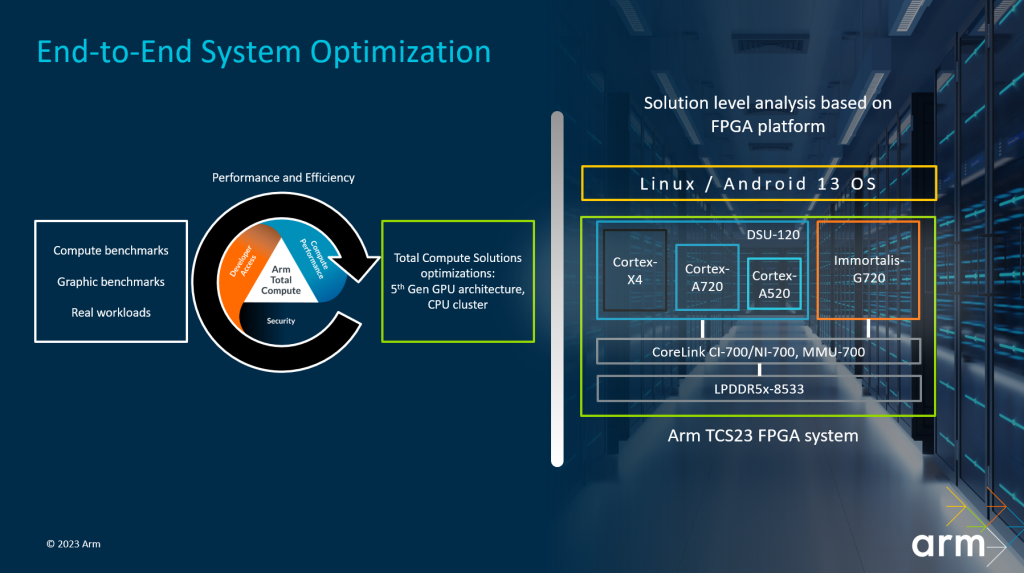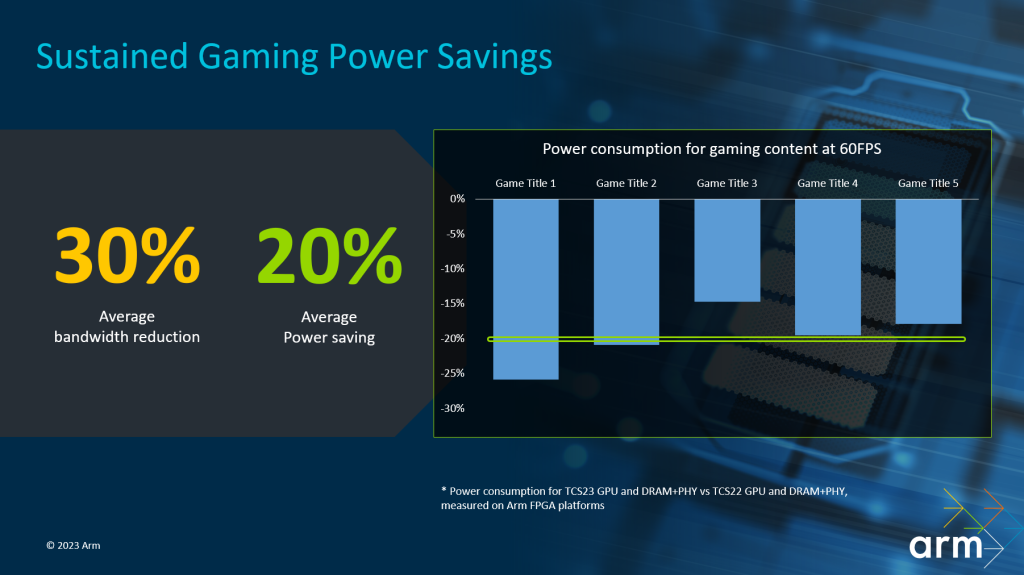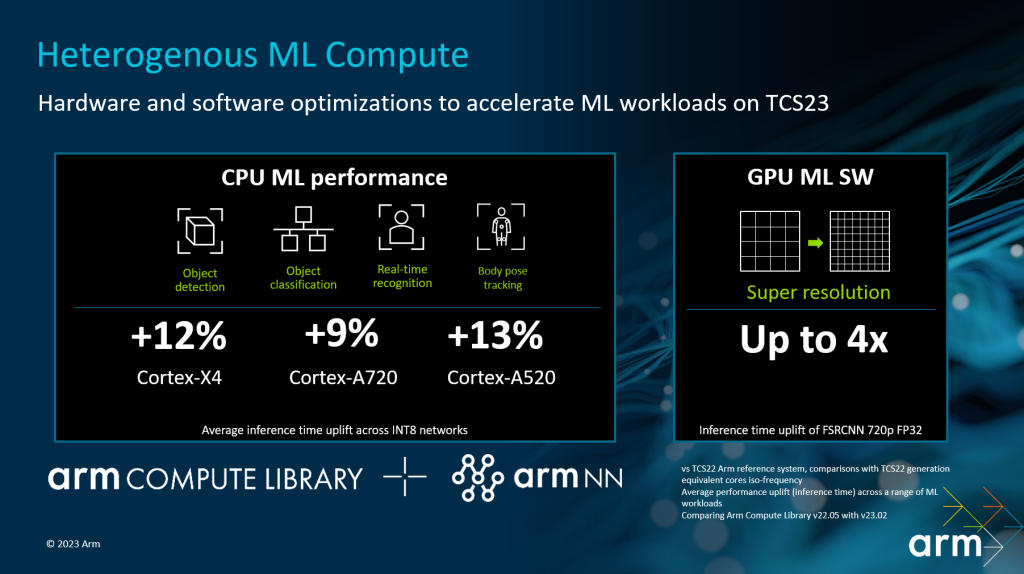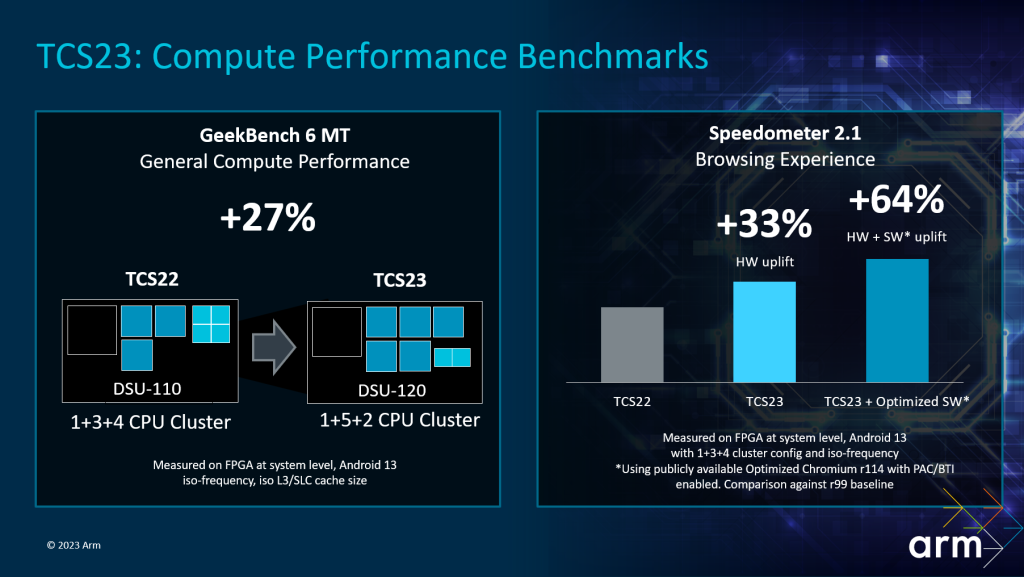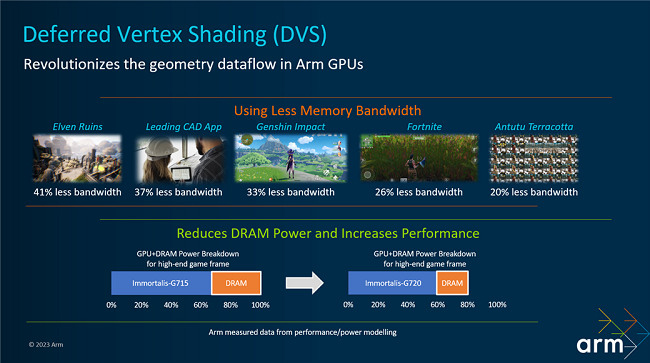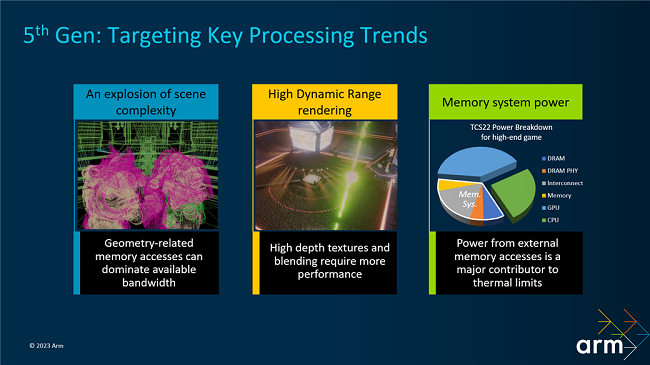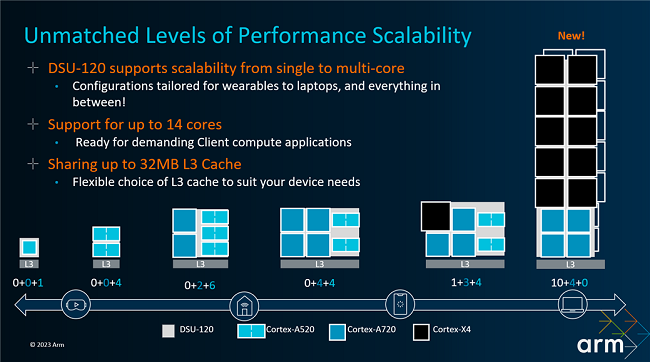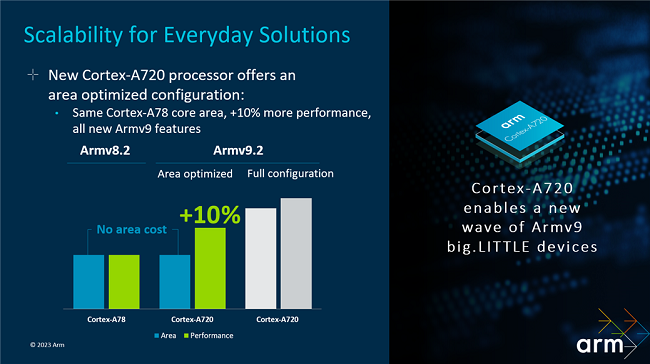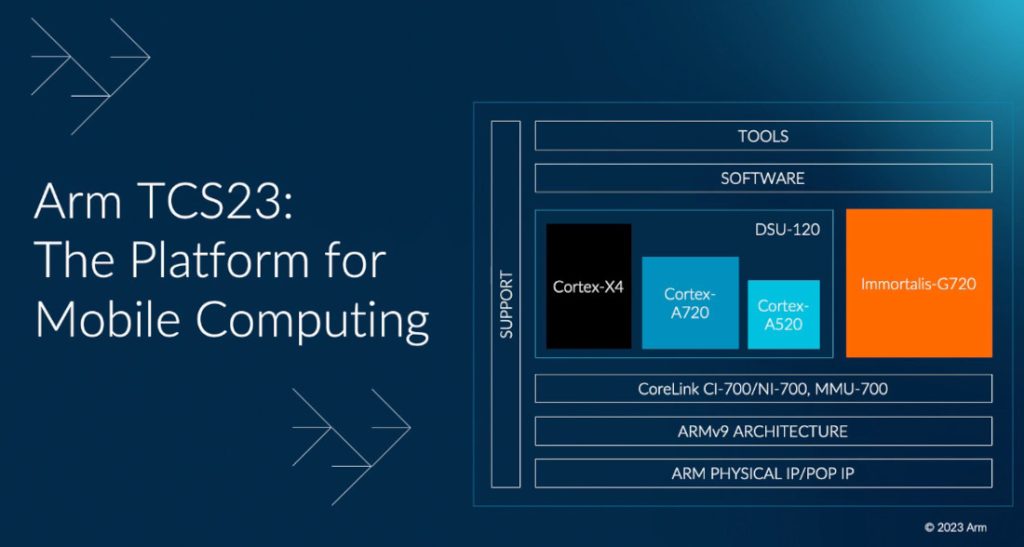
Arm has introduced Arm Total Compute Solutions 2023 (TCS23), a cutting-edge mobile computing platform. TCS23 offers a premium solution for smartphones, combining the latest IP optimized for specific workloads to create a seamless and comprehensive system.
The package includes the remarkable Arm Immortalis GPU, based on 5th Generation GPU architecture (Immortalis-G720, Mali-G720, and Mali-G620), ensuring exceptional visual experiences, as the successor to Immortalis-G715, Mali-G715, and Mali-G615 . Additionally, it features a cluster of Armv9 CPUs (Cortex-X4, Cortex-A720, Cortex-A520 CPUs, and DynamIQ Shared Unit, DSU-120), guaranteeing high performance for next-gen AI.
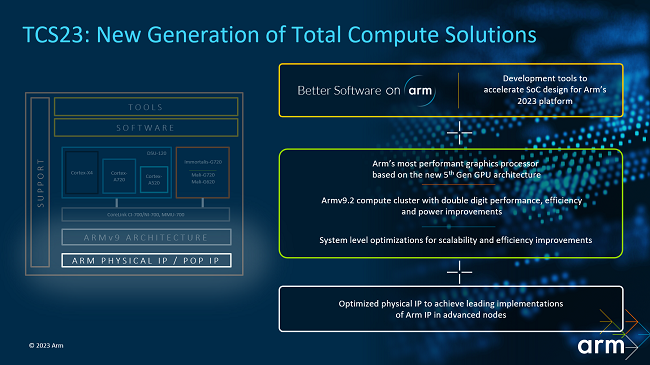
TSC23: Premium, Performance, and Efficiency
- Premium: TCS23 is designed to deliver ultimate performance and compute-intensive experiences for flagship smartphones and laptops. It enhances visual experiences, such as immersive mobile gaming and advanced AI use cases, while maintaining high power efficiency for extended usage.
- Performance: TCS23 caters to various consumer devices, including premium DTVs, set-top boxes, and mid-tier smartphones. It provides high graphics and compute performance for seamless multitasking and a smooth user experience.
- Efficiency: TCS23 offers ultra-scalable solutions for power, cost, and area efficiency. It is ideal for entry-level DTVs, set-top boxes, and wearables, ensuring outstanding battery life and addressing cost-sensitive markets.
TCS23 Benchmarks
- Bandwidth Usage: TCS23 reduces DRAM bandwidth by 30% on average compared to TCS22, with up to 44% reduction in games like Fortnite.
- Peak Performance: TCS23 shows 27% improvement in general compute tasks and up to 21% improvement in the Manhattan 3.0 graphics benchmark.
- ML Compute: TCS23 delivers ML performance gains of 12% to 13% across different CPU cores and achieves a 4x boost on a super resolution FSRCNN network.
- Security Enhancements: TCS23 supports Android Virtualization Framework (AVF) and reduces performance impact on security features like PAC and BTI.
- Complete Platform: TCS23 offers a comprehensive solution for mobile computing, ensuring lower costs, faster time-to-market, and improved overall performance and security.
Arm Immortalis-G720
Arm has launched the Immortalis-G720, their flagship GPU, which delivers significant performance improvements compared to competing GPUs. It outperforms competitors by 67% to 52% in ray tracing benchmarks and 5% to 52% in variable rate shading (VRS) benchmarks.
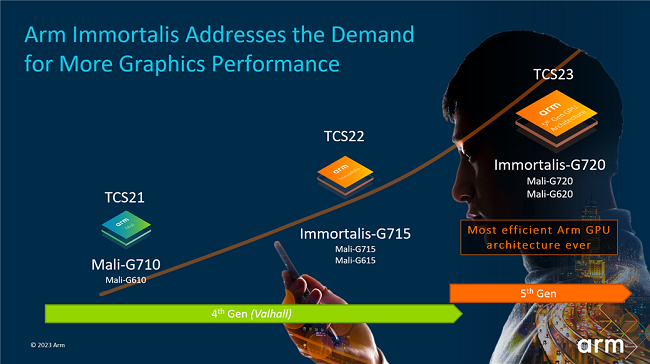
The Immortalis-G720, along with the Mali-G720 and Mali-G620, completes Arm’s lineup of world-class GPUs. Built on the 5th Generation GPU architecture, these GPUs offer leading performance and efficiency, enhancing mobile gaming experiences and providing longer battery life.
The 5th Gen architecture introduces deferred vertex shading (DVS), reducing bandwidth usage in popular games like Genshin Impact and Fortnite by up to 33% and 26% respectively. It also supports high dynamic range (HDR) rendering and enables the addition of PC quality effects.
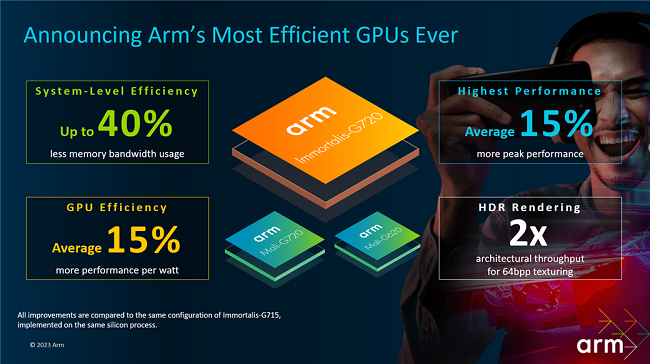
Arm’s GPUs have the largest target base for developers, and the 5th Gen architecture aims to optimize memory system power for improved visuals and potential battery life extension.
Arm Mali-G720 and Mali-G620 GPUs
Arm has introduced the Mali-G720 and Mali-G620 GPUs alongside the 5th Gen architecture. These GPUs offer scalability and premium graphics features for a wide range of consumer devices. The Immortalis-G720 supports 10 or more cores, while the Mali-G720 and Mali-G620 provide support for 6 to 9 cores and 5 cores or fewer, respectively.
Energy efficiency has been improved, with 15% greater efficiency compared to the previous generation, leading to sustained performance and longer battery life.
Memory bandwidth usage has been reduced by up to 40%, and there are significant performance improvements, including a 15% increase in peak performance and doubled architectural throughput for 64bpp Texturing.
The GPUs also enhance shading rates for Variable Rate Shading (VRS) and offer optimized 2x Multi-Sampling Anti-Aliasing (MSAA) for improved graphics quality. Additionally, support for Vulkan dynamic buffers has been improved.
Arm Cortex-A720 and A520 CPUs
Arm has introduced the Cortex-X4 CPU, along with new CPU clusters featuring the Cortex-A720 and A520 CPUs. The Cortex-X4 offers 15% performance improvement and 40% better power efficiency compared to last year’s flagship Android devices.
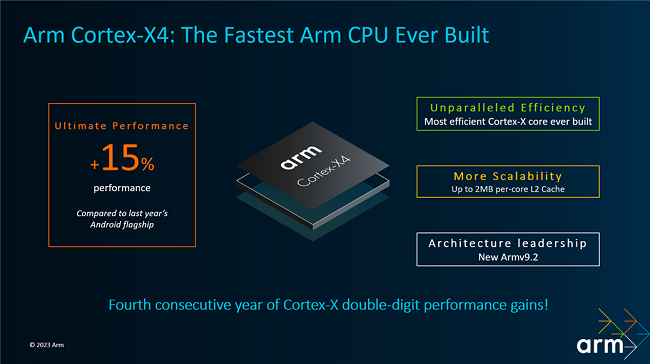
The new DynamIQ Shared Unit (DSU-120) enhances scalability and power-saving modes, enabling clusters with up to 14 cores and larger L3 cache configurations. These advancements make the new CPU clusters the most powerful and highest performing ever built by Arm.
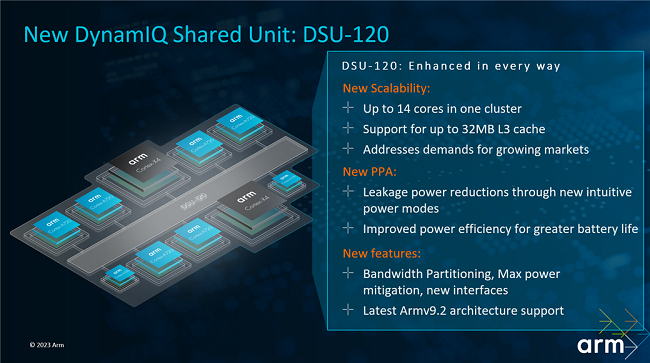
The CPUs are based on the Armv9.2 architecture, which includes features like Memory Tagging Extension (MTE) and QARMA3 algorithm for improved performance and security. Arm provides partners the freedom to innovate and customize CPU clusters based on their specific use cases and computing requirements.
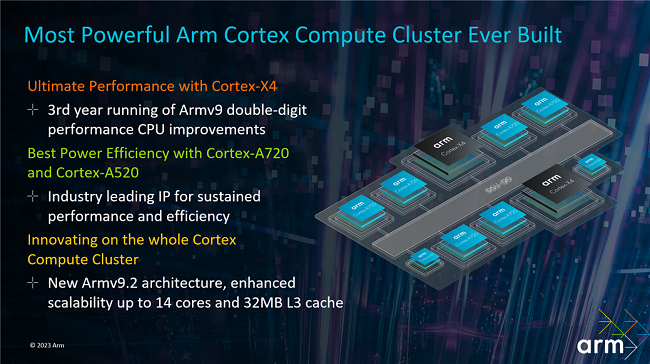
Cortex-A720: Sustained premium performance
- Cortex-A720 delivers industry-leading sustained premium performance with 20% more power efficiency compared to Cortex-A715.
- Optimized for improved system power and longer battery life in consumer devices.
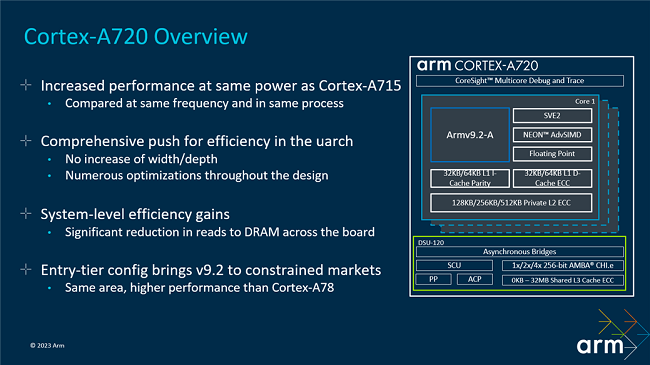
- Microarchitecture improvements and latest process nodes enhance on-device sustained performance.
- Configurable to match Cortex-A78’s area footprint, providing 10% more performance.
- Compatibility with the new DSU-120 for big.LITTLE clusters.
Cortex-A520: Best power efficiency design
- Cortex-A520 focuses on superior power efficiency, with a 22% improvement over Cortex-A510.
- Reduces computing power for low-intensity workloads, improving battery life.
- Microarchitecture-level changes enhance efficiency and deliver up to 8% more performance.
- First true 64-bit only Arm LITTLE CPU, supporting computing performance gains and improved security.
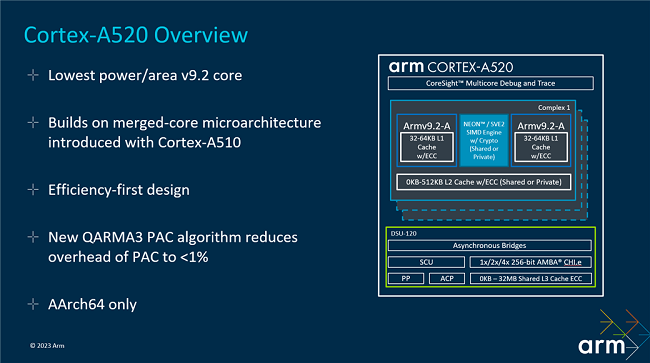
64-bit Architecture and Security Enhancements
- Transition to 64-bit only devices brings greater computing performance, improved security, and simplified app development.
- Armv9 features (PAC, BTI, MTE) remove vulnerabilities, enhancing security.
- Continued security enhancements through Armv9.2 architecture provide robustness and reduced overhead.
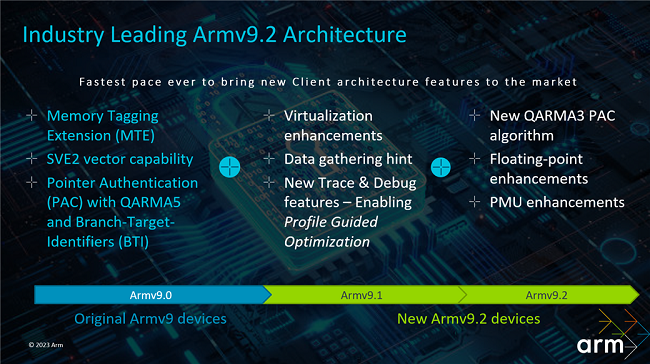
Growth in MTE Enablement
- MTE adoption is expanding across consumer devices, including Cortex-A720 and Cortex-A520.
- MTE helps detect and prevent memory safety vulnerabilities, speeding up application development.
- Arm partners enabling MTE across chipsets, addressing memory safety bugs in the software ecosystem.
- HONOR’s MTE enabled MagicOS devices support developers through Honor SkyNet and DiagnosisKit tools.
Machine Learning and Support for Game developers
Arm remains committed to developing and testing GPUs for machine learning (ML) applications. In the case of 3D scene reconstruction, the Immortalis-G720 GPU achieves 25% more peak performance and consumes 22% less memory bandwidth compared to the Immortalis-G715.
Arm balances power between CPUs and GPUs to ensure a consistent user experience, demonstrated by processing 100 ML agents alongside complex graphics on mobile SoCs through Unity’s ML agents.
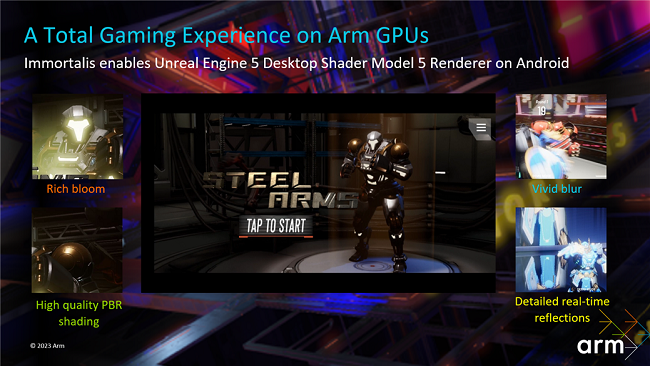
The ecosystem support for game developers includes Arm Mobile Studio, providing profiling and debugging tools. Arm will soon launch Arm Frame Advisor, a frame-based profiler for games.
Collaborations with partners focus on adaptive performance and enabling ray tracing technology. Arm is working with Epic Games to bring Unreal Engine 5 desktop renderer to Android for high-quality graphics.

